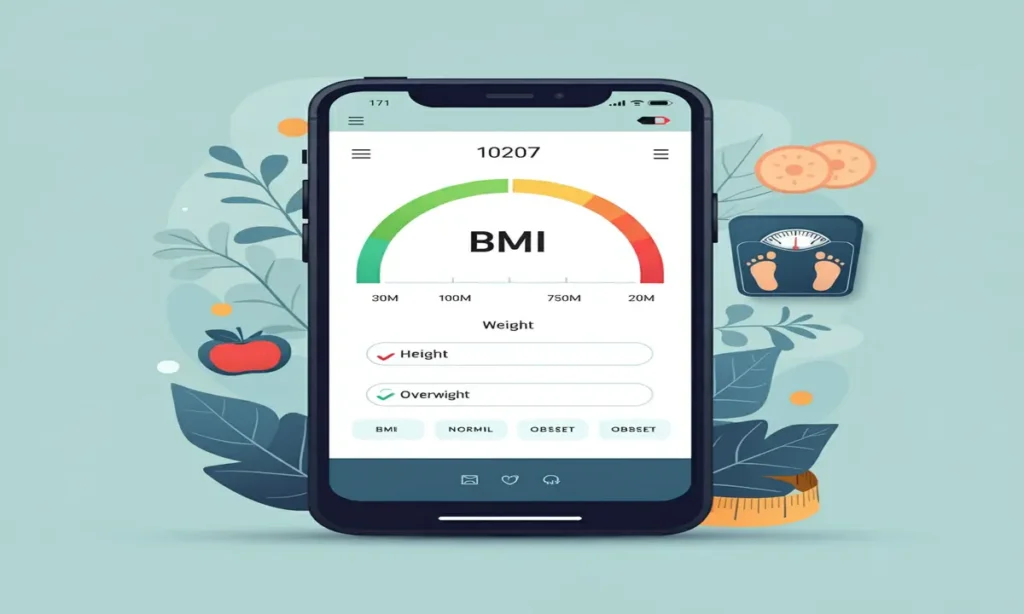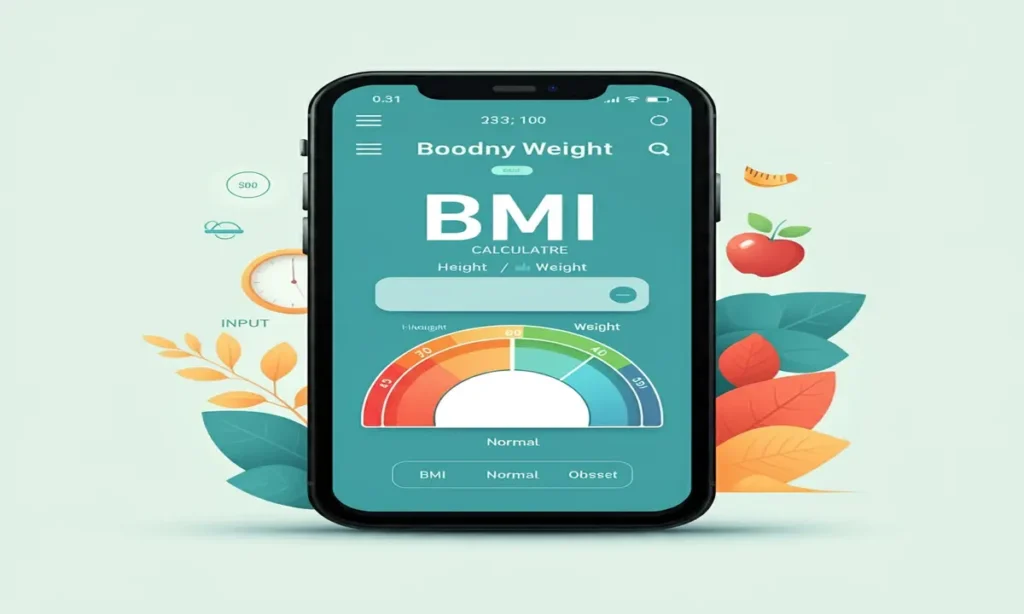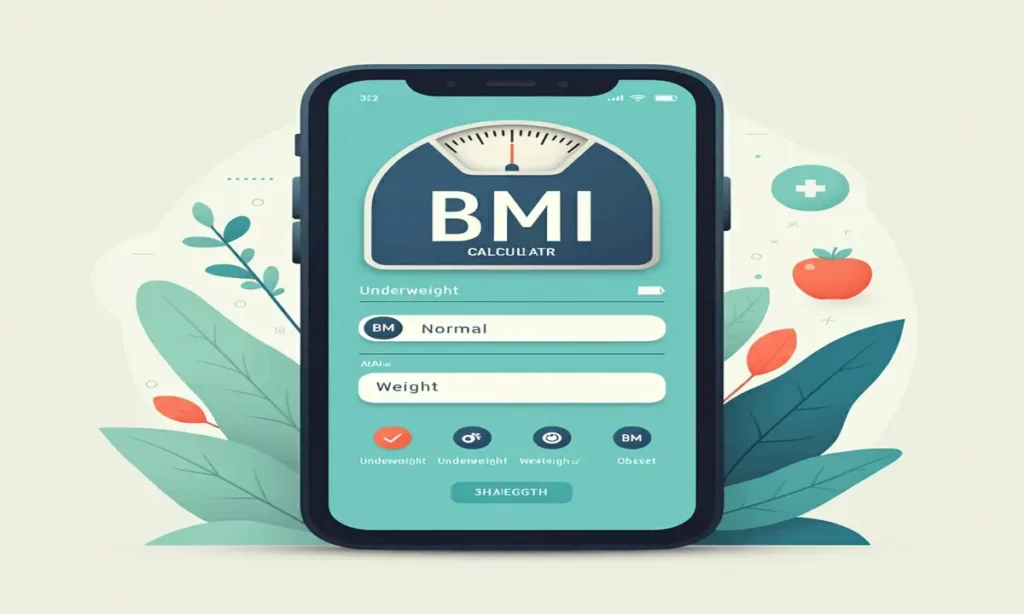Enhanced BMI Calculator
The Body Mass Index (BMI) calculator is an invaluable tool in assessing a person’s body weight relative to their height. It serves as a quick and efficient way to gauge whether an individual falls into a healthy weight range, which can help identify potential health risks related to weight. This article will delve into the concept of BMI, its importance, and how to effectively use a BMI calculator to manage health and wellness.
What is BMI?
BMI, or Body Mass Index, is a numerical value derived from a person’s weight and height. It provides a standardized method to categorize individuals into weight groups, such as:
- Underweight
- Normal weight
- Overweight
- Obese
While BMI does not measure body fat directly, it is widely used as a screening tool to determine whether a person has a healthy weight for their height. It can also serve as an indicator of potential health issues, such as cardiovascular diseases, diabetes, and other conditions linked to weight.

How is BMI Calculated?
The formula for calculating BMI is straightforward:
BMI = Weight (kg)
Height (m)2
Alternatively, for those who prefer using pounds and inches, the BMI formula is:
BMI = Weight (lbs)×703
Height (In)2
For example, if someone weighs 70 kilograms and stands 1.75 meters tall, their BMI will be:
BMI= 70 = 22.86
(1.75)2
This individual falls within the “normal weight” category.
BMI Categories
BMI categories help classify individuals based on their Body Mass Index. Here are the standard categories:
- Underweight: BMI less than 18.5
- Normal weight: BMI 18.5 – 24.9
- Overweight: BMI 25.0 – 29.9
- Obesity Class I: BMI 30.0 – 34.9
- Obesity Class II: BMI 35.0 – 39.9
- Obesity Class III (Severe or Morbid Obesity): BMI 40.0 and above
These categories provide a general guideline for understanding weight status, though they may not reflect body composition, such as muscle mass.
Importance of BMI in Health
BMI is important because it provides a quick snapshot of a person’s weight relative to their height. While it is not a perfect measurement, it serves as a starting point for discussions about weight and health.

1. Screening for Health Risks
A high BMI can serve as a warning sign for various health conditions, helping individuals and healthcare providers take preventive measures. Conditions associated with an elevated BMI include:
- Heart disease: Excess weight can lead to the buildup of plaque in arteries, increasing the risk of heart attacks or other cardiovascular issues.
- Hypertension (high blood pressure): A higher BMI is often linked to increased blood pressure, which puts extra strain on the heart and blood vessels.
- Type 2 diabetes: Being overweight can impair insulin regulation, leading to the development of type 2 diabetes.
- Certain cancers: Studies show that a high BMI is associated with increased risks for cancers like breast, colon, and endometrial cancer.
- Stroke: The same factors that increase the risk for heart disease can also lead to strokes, as plaque buildup may block blood flow to the brain.
- Osteoarthritis: Excess weight puts more pressure on joints, particularly in the knees and hips, increasing the likelihood of developing osteoarthritis.
By knowing one’s BMI, individuals can take proactive steps to reduce these risks. Dietary adjustments, regular exercise, and adopting healthy lifestyle habits can all contribute to maintaining or improving BMI and overall health.
2. Monitoring Weight Loss Progress
For those on a weight loss journey, BMI is an effective tool for tracking progress. It allows individuals to see how their weight changes over time and whether they are moving closer to a healthier BMI range.
3. Public Health Assessment
BMI is widely used in public health research to assess population-level trends in obesity and overweight prevalence. This data helps governments and health organizations develop targeted interventions to address weight-related health issues.
Limitations of BMI
Despite its widespread use, the BMI calculator has certain limitations:
- Does Not Account for Muscle Mass: Athletes or individuals with high muscle mass may have a higher BMI, but they are not necessarily overweight or obese.
- Ignores Fat Distribution: BMI does not differentiate between fat stored around the waist (which is riskier) and fat stored in other areas.
- May Not Be Suitable for Children or Elderly: Special considerations are required when calculating BMI for children, adolescents, and older adults, as their body compositions differ from the general adult population.
How to Use a BMI Calculator
Using a BMI calculator is simple. Most online BMI calculators only require two inputs: weight and height. Here’s a step-by-step guide:
- Enter Weight: Choose whether to input weight in kilograms or pounds.
- Enter Height: Input height in either meters or inches, depending on your preference.
- Calculate BMI: The calculator will instantly provide the BMI value based on the input.
- Interpret the Result: Use the BMI categories mentioned earlier to understand where you fall in terms of weight classification.
BMI Calculator for Adults vs. Children
For adults, the BMI calculator follows the standard formula and categories. However, BMI for children and adolescents (aged 2-19 years) is interpreted differently. In children, BMI is compared to percentiles of a similar age group and gender. This accounts for the natural variations in growth and development.
For example:
- Underweight: BMI below the 5th percentile
- Normal weight: comprises a BMI between the 5th and 85th percentile.
- Overweight: BMI between the 85th and 95th percentiles
- Obesity: BMI above the 95th percentile
Benefits of Using a BMI Calculator
How to Improve BMI
Conclusion
The BMI calculator is a fundamental tool in health and fitness management, providing valuable insight into whether an individual’s weight is within a healthy range. While it has limitations, BMI remains a widely accepted and accessible method for gauging potential health risks associated with weight. For optimal results, use the BMI calculator alongside other health assessments like body fat percentage, waist circumference, and physical activity levels to get a comprehensive picture of your health.
Make sure to regularly check your BMI and maintain a healthy lifestyle to reduce your risk of weight-related health conditions. Whether you’re monitoring your weight or planning a weight loss journey, the BMI calculator can be an essential part of your health toolkit.
BMI Calculator: Frequently Asked Questions (FAQs)
1. What is a BMI Calculator?
A BMI calculator is an online tool used to determine a person’s Body Mass Index (BMI) by inputting their height and weight. The BMI is a numerical value that categorizes individuals into weight categories like underweight, normal weight, overweight, or obese. It helps assess whether a person has a healthy body weight for their height.
2. How is BMI calculated?
BMI is calculated using the following formulas:
- Metric formula:
BMI = Weight (kg)
Height (m)2
- Imperial formula:
BMI = Weight (lbs)×703
Height (In)2
Simply enter your weight and height into a BMI calculator, and it will calculate the result instantly.
3. What is a healthy BMI range?
A healthy BMI falls between 18.5 and 24.9. Here are the general BMI categories:
- Underweight: BMI below 18.5
- Normal weight: BMI 18.5–24.9
- Overweight: BMI 25–29.9
- Obesity: BMI 30 or higher
4. Why is BMI important?
BMI is a useful tool for quickly assessing whether an individual has a healthy body weight, which is important for reducing the risk of several chronic diseases like heart disease, diabetes, and high blood pressure. While BMI alone cannot measure body fat, it serves as a good starting point for evaluating potential health risks associated with weight.
5. Is BMI accurate for everyone?
BMI is not always accurate for certain populations, including:
- Athletes or bodybuilders: People with high muscle mass may have a higher BMI, but that doesn’t necessarily mean they are overweight or unhealthy.
- Children and adolescents: BMI for children is calculated differently and is compared to percentiles based on age and gender.
- Older adults: BMI may not accurately reflect body fat changes in older individuals.
For a more comprehensive assessment of health, BMI should be used alongside other measures, such as waist circumference or body fat percentage.
6. Can BMI distinguish between fat and muscle?
No, BMI does not distinguish between fat and muscle. It calculates weight relative to height without considering whether the weight is from fat or muscle. Therefore, someone with a high muscle mass, like athletes, may have a high BMI but still have a low body fat percentage and be in excellent health.
7. How often should I check my BMI?
It is generally recommended to check your BMI periodically, especially if you are working on weight management or fitness goals. For most people, checking BMI every few months can provide a good indicator of long-term weight trends. However, if you are actively attempting to lose or gain weight, you should check it more often.
8. What should I do if my BMI is outside the normal range?
If your BMI is too high (overweight or obese) or too low (underweight), you can take steps to bring it into the normal range:
- For high BMI: Focus on a healthy diet, regular physical activity, and possibly consult with a healthcare provider to create a tailored weight loss plan.
- For low BMI: Consider a diet rich in nutrients and calories to help gain weight in a healthy manner. Consulting a nutritionist can be helpful.
Always consult a healthcare professional to determine the best course of action.
9. Can BMI be used for children?
Yes, BMI may be used for children, however the interpretation varies. For children and adolescents, BMI is calculated in the same way as for adults, but the results are compared to percentile charts based on age and gender. This comparison helps determine whether a child is underweight, normal weight, overweight, or obese.
10. Can BMI predict health conditions?
While BMI is a useful screening tool, it does not directly predict health conditions. A higher BMI is associated with an increased risk of diseases such as heart disease, type 2 diabetes, and certain cancers, but other factors like genetics, lifestyle, and body composition also play a role in health. Therefore, BMI should be used as part of a broader health assessment.
11. What is the difference between BMI and Body Fat Percentage?
BMI is a general calculation of weight relative to height, while body fat percentage measures the actual proportion of fat in the body. Body fat percentage provides a more accurate picture of a person’s fitness and health, especially in terms of fat distribution, but BMI remains a convenient and widely used screening tool for weight assessment.
12. Is BMI reliable for pregnant women?
BMI is not a reliable indicator for pregnant women because their body weight changes significantly during pregnancy. During this period, healthcare providers use other methods to assess a woman’s health and weight status.
13. Can I use a BMI calculator if I’m very tall or short?
Yes, you can use a BMI calculator, but BMI may not be as accurate for individuals who are extremely tall or short. BMI calculations can sometimes overestimate or underestimate body fat in people at the extremes of height. If you fall into these categories, it’s best to consult with a healthcare provider for a more personalized assessment.
14. How can I lower my BMI?
To lower your BMI, focus on achieving a healthy weight through a combination of:
- Balanced diet: Eat a variety of nutrient-dense foods, including fruits, vegetables, whole grains, and lean proteins.
- Regular exercise: Aim for at least 150 minutes of moderate aerobic exercise or 75 minutes of vigorous exercise per week, along with strength training.
- Healthy habits: Get enough sleep, reduce stress, and avoid unhealthy behaviors like smoking and excessive alcohol consumption.
Consult a healthcare provider for personalized guidance.
15. Is there an ideal BMI?
There isn’t a one-size-fits-all “ideal” BMI. A BMI between 18.5 and 24.9 is considered healthy for most adults, but individual factors like age, muscle mass, and overall health should also be taken into account. It’s always a good idea to talk to your healthcare provider to determine the best weight range for you based on your specific needs.
These FAQs should help clear up any questions you have about the BMI calculator and how it can assist in your health journey. Understanding your BMI is just one step toward maintaining a healthy lifestyle, so make sure to use this tool wisely and consult a professional for further advice!
The amazing offer you can’t miss:


4 thoughts on “BMI Calculator”